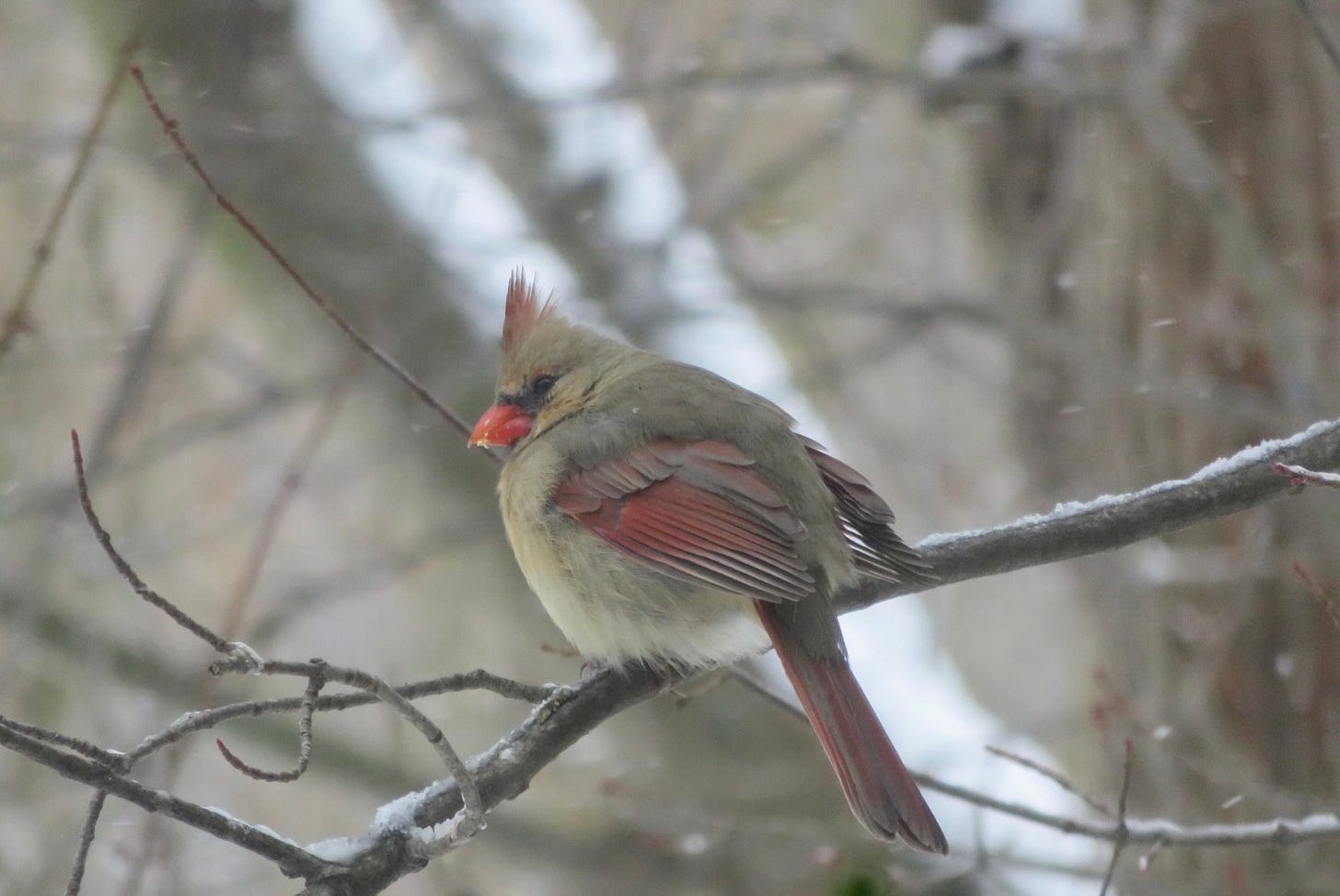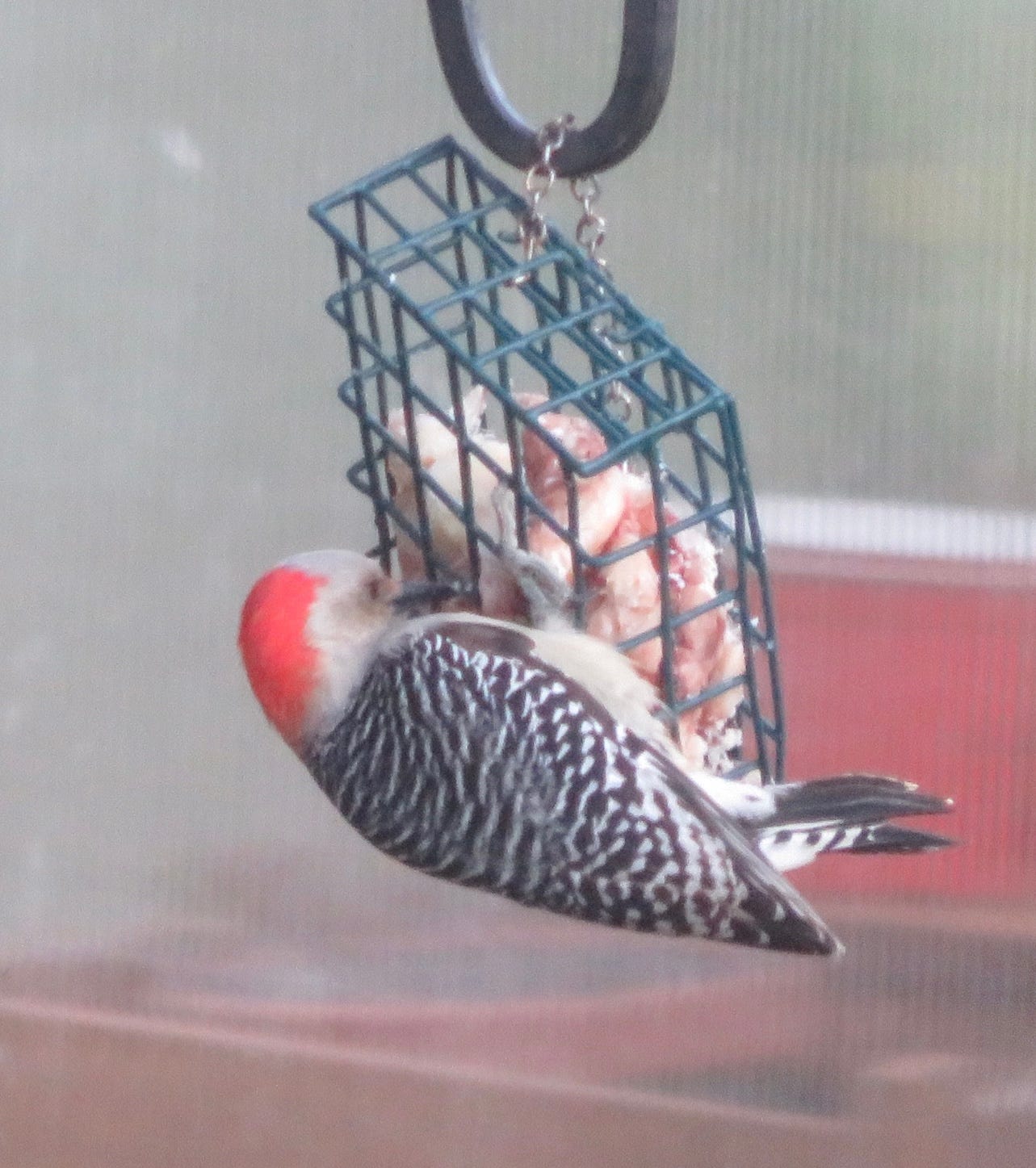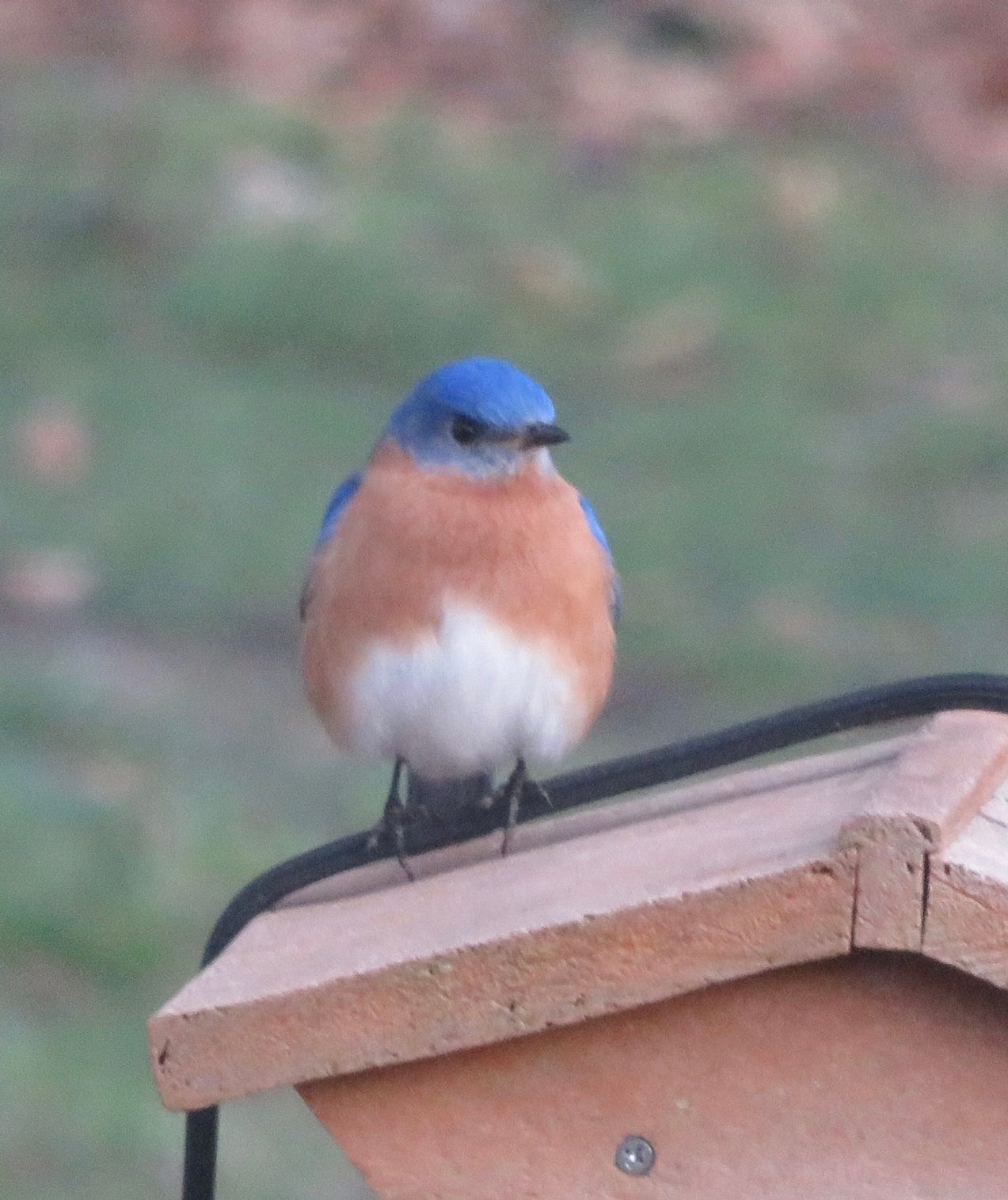I believe I understand the true meaning of the word transitory, and that is the practice of feeding wild birds as a life activity. I wanted to think it has permanence, but what does, really?
Having strained my back this week, I was unable to get out and fill my feeders for a few days. And it made me wonder, what if I’d died? Would “my” birds have survived?
As a little girl, I was fascinated by the variety of birds congregating outside the kitchen windows when we visited my grandparents in northwest Pennsylvania. My grandfather cobbled bird feeders together from scraps of wood, tin cans, and plastic milk jugs. He hung them with wire, rope, and bent coat hangers from the branches of the myriad trees in the woods just outside the old farmhouse. Two large windows furnished a closeup view of the birds feasting on the corn, sunflower seeds, and bacon fat he provided.
Moving around often while growing up, we never had much of anything in our yards, not to mention zero expendable income for feeding the birds - I’m sure our parents had enough trouble filling the tummies of their four growing children!
We lived in Colorado, New Mexico, and Texas, but my parents were from Cleveland. My mother’s parents retired to the family farm in Pennsylvania, and it was always our vacation destination, summer or winter. It was the one and only haven of stability in our lives. I always felt safe there, and it seemed never to change. In the summer we picked berries and chased fireflies; in the winter I baked pies with my grandmother in her warm, fragrant kitchen, or sat on grandpa’s lap at the kitchen table as he rattled off names of the various birds alighting on branches and feeders.
“Chicka-dee-dees,” he’d say, or “there’s a Tufted Titmouse, the blue ones are bluejays, redbird’s a cardinal, upside down bird - that’s a nuthatch!” He knew them all, just as he knew every tree, wildflower, salamander or fungi in the woods. On warm summer days, we followed at his heels, stumbling over twigs, listening intently as he identified the wonders at our feet. But when it snowed, we watched the birds.
When our family moved east to Michigan, my mother hung a few feeders on the clothes pole in our backyard. I was too busy making a new life as a teenager to pay much attention then, but when I finally had a “home” after college, I cobbled a few feeders of my own together, and bought cheap birdseed to fill them. Again, I moved too often to enjoy them much, but after moving in with a man who owned a house in the country, I was in my element. I set about making that house a home, baking bread, sewing curtains, growing vegetables, and hanging bird feeders from the branches of the huge old maple tree outside the dining room window.
The relationship didn’t work well at all, but I hung on for dear life, much to my shame, largely due to reluctance to leave the home I loved, in spite of the fact that the man who owned it had become increasingly abusive as his alcoholism escalated. Finally, after nearly ten years, I left.
That first winter, I grieved the ending of the relationship, the loss of a dog and cat I’d left behind, and all the time I felt I’d wasted, but I also worried about the many wild birds I’d fed over the years. I knew he wouldn’t fill the feeders - would he take them down? Would they find other places to feed? I’d read that while some experts opine that wild birds don’t need human help to survive, other research shows that backyard feeders greatly improve wild bird survival, especially during migration and harsh winters.
It’s generally agreed that whether you feed them or not, wild birds are an asset to a natural ecosystem, vital to the food chain as both predators and prey. By attracting birds to your garden, a balance is created, supporting beneficial insects as well as small animals.
My parents had built their retirement home in the country on the banks of Kalamazoo river. They spent twenty years creating an ecosystem and a sanctuary, home to all manner of plants, trees, wild birds and animals. A large portion of their time and money went into feeding and watching the birds. Their property was a National Wildlife Federation certified wildlife refuge.
So when my father died, and my mother moved in with my husband and me, both my mother and I were very concerned about their bird feeders going empty. Dad died in the wintry month of February, in Michigan, when natural seed sources for birds have been gravely diminished.
Naturally, I drove the forty miles to my parents’ home and back every week for the rest of that winter, to check on the house and more importantly, to fill the bird feeders. And meanwhile, back at our house, I hung extra feeders in the windows so that my mother could watch the birds from her new abode. Years later, when she moved in with my sister, she enjoyed the feeders there, as well. My sister happens to live next door to our grandparents’ old farmhouse in Pennsylvania, where it all started.
My husband and I have spent the past thirty-plus years creating our own wildlife sanctuary, with a pond, fields, wooded areas, and gardens surrounding the home we built on nearly forty acres. We call it Darwin’s Eden.
A large number of domestic birds call various coops and barnyard home here, but on the other side of the house, dozens of feeders hang from various hooks, branches, and poles. It’s a virtual carnival of feeders, a cirque de soleil of feeders, and some days the air is filled with the cacophony of chirping, trilling, singing, and calling. I love it.
I confess that I sometimes fill feeders in the warmer months, too, for the purely selfish reason that I enjoy watching birds bring their babies to score a treat. I also spoil them with heated bird baths in winter. Much of a bird’s energy is consumed by melting snow to drink. And some of my favorite feeders are the suet feeders, where woodpeckers congregate.
I’m often warned about bird flu, but we’ve been lucky so far, and I intend to keep doing what I’m doing - keeping things clean and flocks healthy as possible. Loosely quoting the Dalai Lama, “If you can do something about a situation, why worry? And if you can't do something about a situation, why worry?”
I’ll keep feeding and enjoying the birds for as long as I am able, and when I’m gone, they will survive, somehow, I’m sure. Life is transitory. Try to enjoy each day.
.










Beautiful essay and photographs, Marsi! I Iove birds, as did my mother. My Dad would purchase huge bags of birdseed and plenty of suet for the birds. They enjoyed watching them feed right outside their dining room window.
Beautiful essay, Marsi. I love the photographs. Thanks for brightening my day.